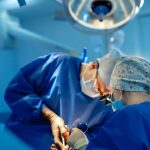Researchers at the University of Texas at Austin have developed a hand-held surgical “pen” that can analyze tissue samples and tell a surgeon if they are cancerous in just a few seconds, a report from Medgadget said.
During surgery to remove a tumor, surgeons need to know if they have removed the entire tumor margins, as leaving just a small piece of neoplasm could mean that it grows back. Often the tumor looks very similar to healthy tissue, making it difficult to distinguish, and a surgeon will sometimes remove large areas of healthy tissue to make sure that they remove all the cancerous cells. This can cause unnecessary pain and prolonged recovery for cancer patients after surgery.
One solution is to take biopsies from areas at the tumour border during surgery and check if they are cancerous in the lab. This can take 30 minutes or longer, and meanwhile, the patient risks infection and an increased chance of adverse effects from anaesthetics while they wait on the operating table. In many cases the results are provided only after surgery, often necessitating another procedure.
The new MasSpec Pen works using mass spectrometry to analyze and identify molecules produced during metabolism within cells. These metabolites can act as hallmarks for different types of cancer.
“Cancer cells have dysregulated metabolism as they’re growing out of control,” says Livia Schiavinato Eberlin, a scientist involved in the research. “Because the metabolites in cancer and normal cells are so different, we extract and analyze them with the MasSpec Pen to obtain a molecular fingerprint of the tissue. What is incredible is that through this simple and gentle chemical process, the MasSpec Pen rapidly provides diagnostic molecular information without causing tissue damage.”
The surgeon can simply point the device at a suspect piece of tissue and can get an indication as to whether the tissue is cancerous or healthy within 10 seconds, and in tests the device was 96 per cent accurate. The technology is similar to another surgical probe that featured previously onMedgadget, which instead used Raman and fluorescence spectroscopy to analyze tissues during surgery, and one that is already cleared by the FDA that relies on measuring how an electric current passes through tissues. In any case, it is encouraging that multiple research groups are developing this type of technology, which should significantly help improve surgical treatments for cancer.












